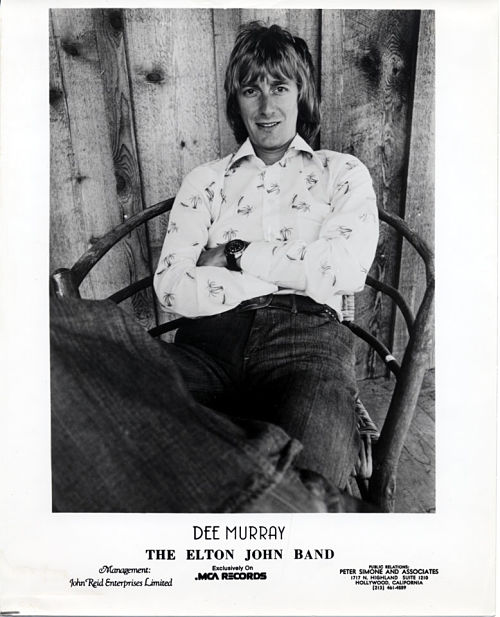Dee Murray (Elton John Band)

By Thomas Semioli
He anchored the Elton John Band during their initial glory years in the early 1970s, and on the piano player’s subsequent comeback tours and slabs until his passing in 1992.
David Murray Oates, aka Dee Murray, was among the signature bassists of his era. A melodic and pocket player extraordinaire – Dee’s passages were instrumental (pun intended) throughout the former Reggie Dwight’s unparalleled career. With Dee Elton waxed great records. Sans Dee, Elton waxed very good records – though we tip the KYBP hat to Kenny Passarelli on Rock of the Westies (1975), and Blue Moves (1976).
Murray first came to prominence with the Spencer Davis Group in the late 1960s where he was paired with his future EJ Band drummer Nigel Olsson. Dee and Nigel commenced their work with Elton in 1970. For some odd reason, producer Gus Dudgeon opted for mostly studio players on Tumbleweed Connection (1970) and Madman Across The Water (1971) despite the fact that he later commented that Dee was among the best bassists he’d ever worked with, and that Murray often nailed his parts in one or two takes upon first hearing the track.
To atone for Dudgeon’s curious refusal to utilize his extraordinary road band in the studio during his early career (and to stem the tide of bootlegs), Elton John released 11-17-70 which is among the essential live albums of any era in rock. Dee and Nigel distinguished themselves as an elite rhythm section comparable to Entwistle/Moon and Bruce/Baker.
Dig Dee on “Sixty Years On” from 11/17.70 https://youtu.be/rRngmF-AcFQ
In 1972 Elton had the clout to call the shots, and Dee, Nigel and newly added guitarist Davey Johnstone were now in the studio wherein they cut a historic run of era defining pop-rock gems Honkey Chateau (1972), Don’t Shoot Me I’m Only the Piano Player (1972), Goodbye Yellow Brick Road (1973), Caribou (1974) and Captain Fantastic & The Brown Dirt Cowboy (1975).
Dee deep album tracks:
“Salvation” https://youtu.be/BaXnZmAvxJQ
“Honky Cat” https://youtu.be/iPicSRPwogI
“Elderberry Wine” https://youtu.be/iPicSRPwogI
“All The Young Girls Love Alice” https://youtu.be/DkZ2tpLugsE.
“Grimsby” https://youtu.be/M7K3ddSNGbA
“Tell Me When the Whistle Blows” https://youtu.be/tU7-WxUEv74
Murray and Olsson, who were also world class backing vocalists and arranged their own parts, which was a major component in Elton’s chart-topping successes.
When Elton canned Murray and Olsson in 1975, his career tanked artistically and commercially. When he rehired Dee and Nigel in the early 1980s, his career enjoyed a remarkable resurgence.
Latter day Dee with Elton…
“Cold as Christmas” https://youtu.be/hH_asvZ799U
“Kiss the Bride” https://youtu.be/tkmwVDLMZNk
“Just Like Belgium” https://youtu.be/nEuo-ZEfcXY
Aside from Elton, Dee worked in Nashville as a studio player, anchoring sessions for Bob Weir, John Prine, Shaun Cassidy, Yvonne Elliman and Procol Harum among others.
Dee and Nigel with Bob Weir: “Easy to Slip” https://youtu.be/EjOkk8uf4Cw
Murray’s weapon of choice with Elton was primarily a Fender Jazz bass, and on occasion, a Fender Precision (see photo below). In the 1980s, Dee utilized the Steinberger XL.
Dee, Nigel, Davey, Bernie Taupin, and Ray Cooper’s omission from the Rock and Roll Hall of Fame in the Musical Excellence category is inexcusable.
Coda: Tom Semioli / Huffington Post “11 Bass Players Who Belong in the Rock and Roll Hall of Fame” Dee Murray https://bit.ly/2UBjiyg
Dig Tony Senatore’s rendition of classic Dee tracks:
“Bad Side of the Moon” https://youtu.be/1XcSszsPE_c
“Step Into Christmas” https://youtu.be/EDr63mHDt3w
“Take Me to the Pilot” https://youtu.be/wuPx9P2iNjU
“Bitter Fingers” https://youtu.be/Fzm8dMa9ows
“Grey Seal” https://youtu.be/j3KODmu4qUk
By Tony Senatore:
In 1972, John re-recorded the song with his band (Dee Murray, Nigel Olsson and Davey Johnstone) during the sessions for Don’t Shoot Me I’m Only the Piano Player. The new recording used piano instead of harpsichord, and strings and oboe arranged by Paul Buckmaster.
Originally issued as the B-side of the hit-single “Daniel”, it first appeared on CD in 1988 as part of the DJM issue of the Lady Samantha compilation album, then a few years later in the US and abroad on the 1992 Mercury release Rare Masters, and as a bonus track on the 1995 reissue of Don’t Shoot Me I’m Only the Piano Player.
The 1972 version of “Skyline Pigeon” appears again on the third CD of John’s 2017 compilation box set Diamonds.
“Skyline Pidgeon” https://youtu.be/IlA0jl4foEI
